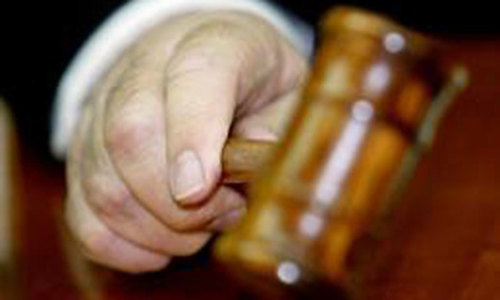AMONG the many distortions introduced in the Constitution, a number of which have been reversed and corrected over the decades, the two amendments to introduce and extend the life of military courts for civilians accused of terrorism by the state must surely rank as some of the most consequential.
Approved by a democratically elected parliament and supported by the two largest political parties in the country, the 21st and 23rd amendments to the Constitution have, in fact, disturbed the democratic order, with the fundamental rights of the people of Pakistan eroded by the very representatives of the people. That institutions of the state may have demanded and sanctified military courts underlined the extent of the state’s drift from a rights-based and freedom-maximising interpretation of the Constitution. Resistance was needed, but none was evident.
Now, a second consecutive parliament is on the verge of taking up the issue of military courts — once again to extend the life of these courts, rather than to disband them and take up the matter of urgent judicial reform.
What is perplexing is that the PTI — which has signalled that it will consult with the opposition to reach the necessary numbers in parliament to approve another constitutional amendment to extend the life of military courts — has an explicit reforms-based governance and legislative agenda.
The incoming chief justice of the Supreme Court is highly regarded as one of the best criminal law justices in the country. Surely, then, now is the time for parliament along with the judicial institution and other relevant bodies to take up the matter of criminal law reform in the country.
Military-court trials for civilians accused of terrorism were justified on the basis of a national emergency and a need to have an instrument to punish the very worst terrorists captured by the state. But the Army Public School attack, in the wake of which military courts were activated, occurred more than four years ago. Unquestionably, the security situation in the country today is much improved.
More relevantly, a recent Peshawar High Court judgment that set aside the convictions of more than 70 individuals tried in military courts has exposed the intrinsic and very serious problems of fairness, due process and justice itself in the operation of such courts.
The PHC judgment has been suspended on appeal in the Supreme Court, but it has laid bare enough troubling problems with the operation of military courts that an extension to the life of these courts ought not to be considered at this moment. Instead of perpetuating injustice, the PTI-led government must turn its attention to addressing continuing problems such as missing persons.
The fight against militancy, terrorism and violent extremism will of necessity be long. But the country must not lose its constitutional, democratic and fundamental-rights moorings in the process.
Published in Dawn, January 10th, 2019













































